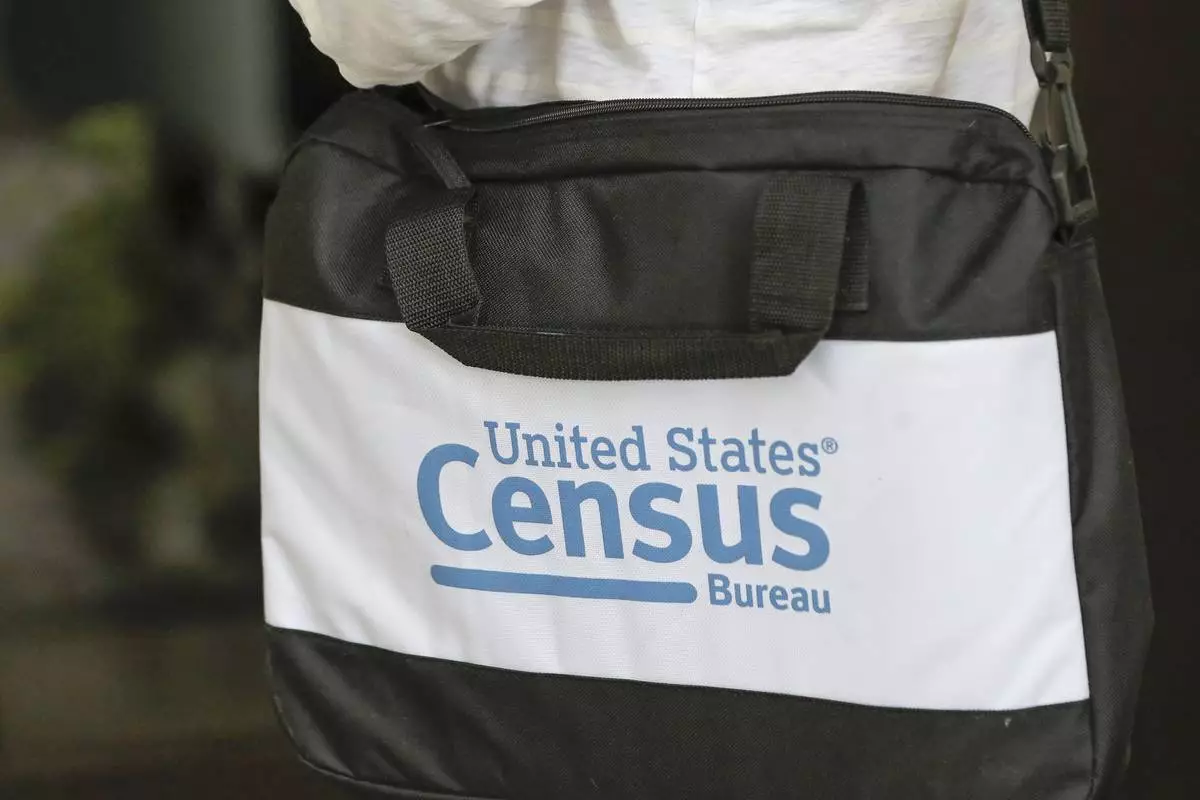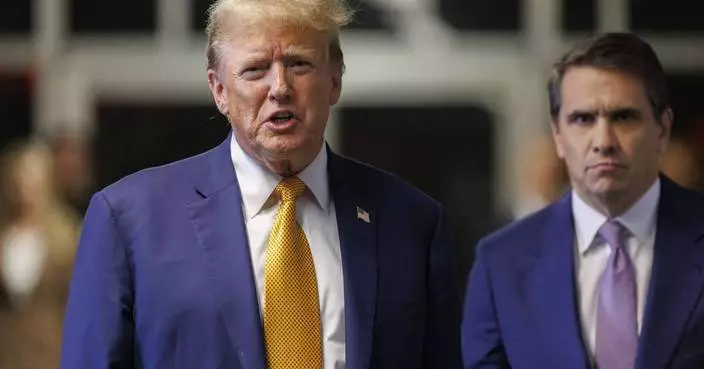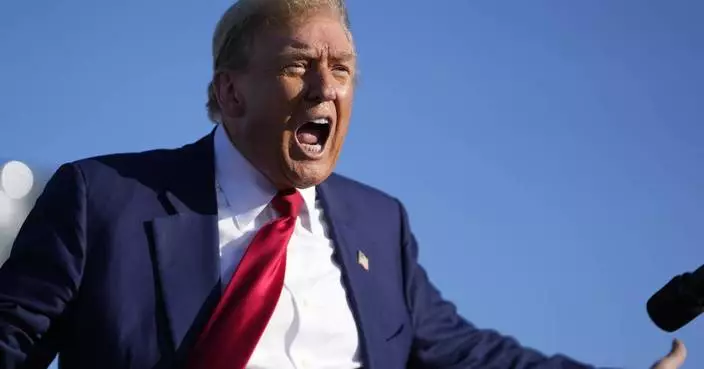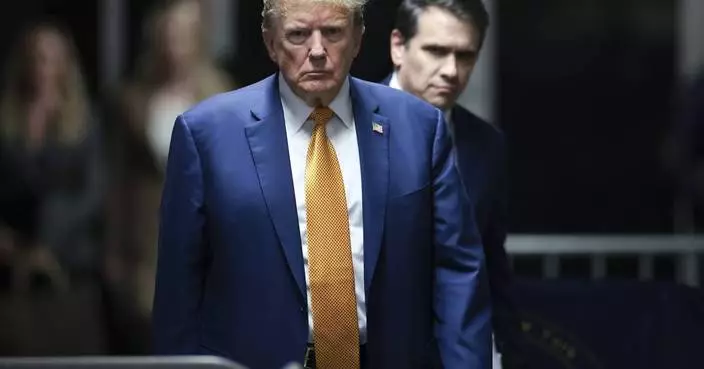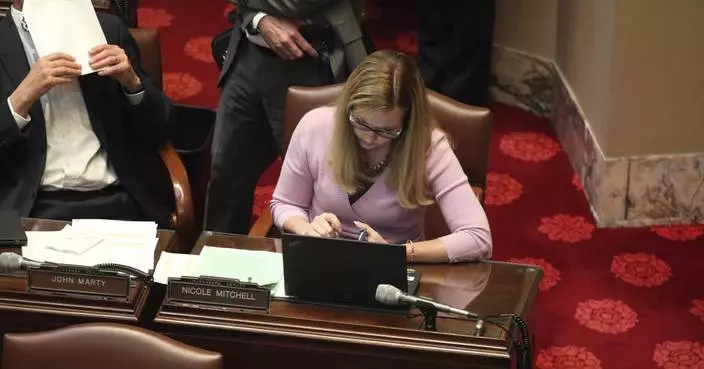South Korean President Moon Jae-in has shaken off a suggestion that he receive the Nobel Peace Prize, saying that U.S. President Donald Trump "can take the Nobel prize" as long as the Koreas receive peace in return.

FILE - In this June 16, 2004 file photo, South Korean army soldiers remove loudspeakers used for propaganda near the demilitarized zone between South and North Korea, in Paju, South Korea. South Korea says it will remove propaganda-broadcasting loudspeakers from the tense border with North Korea. (AP Photo/ Lee Jin-man, File)
Moon made the comment Monday in response to a suggestion that he receive the award by the widow of late South Korean President Kim Dae-jung, who was awarded the Nobel Peace Prize in 2000 after a summit with then North Korean leader Kim Jong Il.
Moon held a summit with current leader Kim Jong Un last week in which Moon and Kim, the son of Kim Jong Il, walked together across the tense border and agreed to a raft of initiatives meant to ease animosity. Moon responded to the suggestion of Nobel glory by saying, "President Trump can take the Nobel prize. The only thing we need is peace," according to the South's presidential office.

This satellite image released and notated by Airbus Defense & Space and 38 North on April 12, 2017, shows the Punggye-ri nuclear test site in North Korea. North Korean leader Kim Jong Un vowed to shut down his country's nuclear test site in May 2018 and disclose the process to experts and journalists from South Korea and the United States, Seoul's presidential office said Sunday, April 29, 2018. (Airbus Defense & Space/38 North/Pleiades CNES/Spot Image via AP)
South Korea also said Monday that it will remove propaganda-broadcasting loudspeakers from the border with North Korea this week as the rivals move to follow through with their leaders' summit declaration that produced reconciliation steps without a breakthrough in the nuclear standoff.
During their historic meeting Friday at a Korean border village, Kim and Moon agreed to end hostile acts against each other along their tense border, establish a liaison office and resume reunions of separated families. They also agreed to achieve a nuclear-free Korean Peninsula, but failed to produce specific time frames and disarmament steps.

This satellite image released and notated by Airbus Defense & Space and 38 North on April 12, 2017, shows the Punggye-ri nuclear test site in North Korea. North Korean leader Kim Jong Un vowed to shut down his country's nuclear test site in May 2018 and disclose the process to experts and journalists from South Korea and the United States, Seoul's presidential office said Sunday, April 29, 2018. (Airbus Defense & Space/38 North/Pleiades CNES/Spot Image via AP)
Seoul's Defense Ministry said it would pull back dozens of its front-line loudspeakers on Tuesday before media cameras. Ministry spokeswoman Choi Hyunsoo said Seoul expected North Korea to do the same.
South Korea had already turned off its loudspeakers ahead of Friday's summit talks, and North Korea responded by halting its own broadcasts.
The two Koreas had been engaged in Cold War-era psychological warfare since the North's fourth nuclear test in early 2016. Seoul began blaring anti-North Korean broadcasts and K-Pop songs via border loudspeakers, and North Korea quickly matched the action with its own border broadcasts and launches of balloons carrying anti-South leaflets.
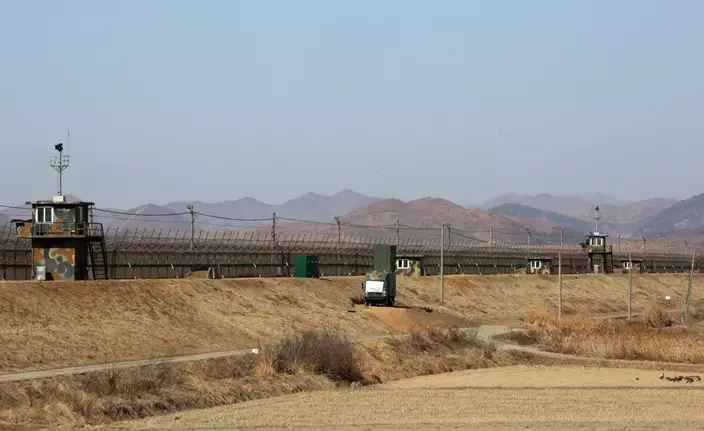
In this Feb. 15, 2018 photo, a South Korean military vehicle with loudspeakers is seen in front of the barbed-wire fence in Paju, near the border with North Korea, South Korea. South Korea on Monday, April 30, 2018, said it will remove propaganda-broadcasting loudspeakers from the tense border with North Korea. The announcement came three days after the leaders of the two Koreas agreed to work together to achieve a nuclear-free Korean Peninsula and end hostile acts against each other along their border during their rare summit talks. (AP Photo/Ahn Young-joon)
Seoul's announcement came a day after it said Kim told Moon during the summit that he would shut down his country's only known nuclear testing site and allow outside experts and journalists to watch the process.
South Korean officials also cited Kim as saying he would be willing to give up his nuclear programs if the United States commits to a formal end to the Korean War and a pledge not to attack the North. Kim had already suspended his nuclear and missile tests while offering to put his nuclear weapons up for negotiations.
The closing of the Punggy-ri test site, where all six of North Korea's atomic bomb tests occurred, could be an eye-catching disarmament step by North Korea. But there is still deep skepticism over whether Kim is truly willing to negotiate away the nuclear weapons that his country has built after decades of struggle.
According to a summit accord, Kim and Moon agreed to achieve "a nuclear-free Korean Peninsula through complete denuclearization," rather than clearly stating "a nuclear-free North Korea." North Korea has long said the term "denuclearization of the Korean Peninsula" must include the United States pulling its 28,500 troops out of South Korea and removing its so-called "nuclear umbrella" security commitment to South Korea and Japan.
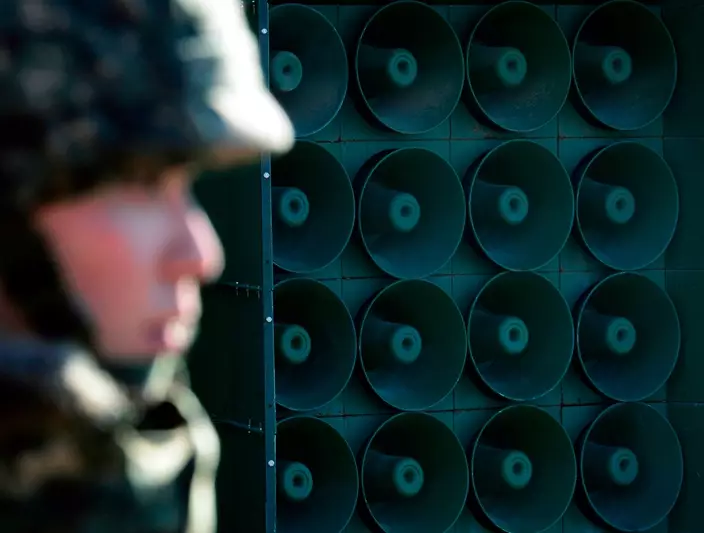
FILE - In this Friday, Jan. 8, 2016 file photo, a South Korean army soldier stands near the loudspeakers near the border area between South Korea and North Korea in Yeoncheon, South Korea. South Korea on Monday, April 30, 2018, said it will remove propaganda-broadcasting loudspeakers from the tense border with North Korea. (Lim Tae-hoon/Newsis via AP, File)
Kim could offer more disarmament concessions during his meeting with Trump, expected in May or June, but it's unclear what specific steps he would take. Some experts say Kim may announce scraping North Korea's long-range missile program, which has posed a direct threat to the United States.
U.S. National Security Adviser John Bolton reacted coolly to word that Kim would abandon his weapons if the United States pledged not to invade.
Asked on CBS's "Face the Nation" whether the U.S. would make such a promise, Bolton said: "Well, we've heard this before. This is — the North Korean propaganda playbook is an infinitely rich resource. What we want to see from them is evidence that it's real and not just rhetoric."
Kim's meeting with Moon was his second summit with a foreign leader since he took office in late 2011. In March, he traveled to Beijing and met with Chinese President Xi Jinping. While meeting with Xi, Kim suggested he prefers a step-by-step disarmament process in line with corresponding outside rewards, according to Chinese state media. U.S. officials want the North to take complete, verifiable and irreversible disarmament measures.
China said Monday that its foreign minister, Wang Yi, will visit Pyongyang, North Korea's capital, on Wednesday and Thursday.
China is North Korea's only major economic partner, but trade has declined by about 90 percent following Beijing's implementation of economic sanctions imposed over the North's nuclear and missile tests. Some analysts say Kim's recent charm offensive was aimed at weakening the sanctions.
Also on Monday, the North's parliament adopted a decree to sync its time zone with South Korea's this Saturday. North Korea's official news agency said the move was made at the proposal of Kim, who found it was "a painful wrench to see two clocks indicating Pyongyang and Seoul times hanging on a wall of the summit venue."
Moon's office said Sunday that Kim made similar remarks to Moon during the summit.
The North in 2015 had set its clocks 30 minutes behind South Korea and Japan, saying the measure was aimed at rooting out the legacy of Tokyo's 1910-45 colonial rule of the Korean Peninsula.



